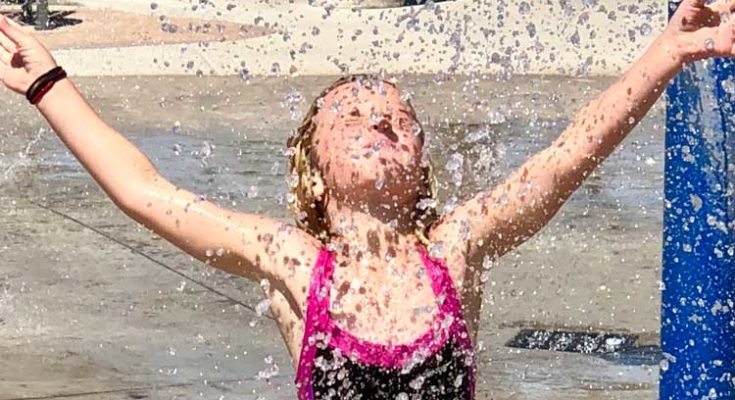Jon Johnson File Photo/Gila Herald: Avalon Johnson enjoys getting wet at the Thatcher Splash Pad.
Column By Melissa Martin

Summer is a season for running in the yard, swimming, and playing in a tree house, but for some children, summer becomes a dangerous or deadly season.
Lawn Mower Safety
Data from the U.S. Consumer Product Safety Commission shows that when visits to doctors’ offices and clinics are included, more than 17,000 children and teens are treated for lawn mower injuries each year, according to the American Academy of Pediatrics. Usually, the victims are older children or teens, but one in four injuries occurs to children younger than 6 years.
And 75 children die each year due to lawnmower injuries. Boys are injured more frequently than girls. Injuries are seen most often in young children (1-3 years) and teenagers. Lawnmowers are the leading cause of traumatic amputations (loss of all or part of a limb) in children. When these injuries happen, nearly 90% of children are injured in their own yard. Nearly 80% are injured by the usual user of the mower. About 50% happen while the mower is in reverse. “The energy of the rotating blade is more powerful than a 0.357 Magnum gun.” www.orthokids.org.
According to the U.S. Consumer Product Safety Commission, Lawnmowers cause more than 600 amputations in children each year.
According to Nationwide Children’s Hospital website in Columbus, Ohio, the following are common lawn mower-related injuries: deep cuts, loss of fingers, hands, toes or feet, broken and dislocated bones, burns, eye injuries, and soft tissue damage.www.nationwidechildrens.org.
Limbs Matter is an organization composed of families that came together to spread a message about lawnmower safety. Watch their Public Service Announcement on YouTube. Warning: If you don’t want to experience a gamut of emotions and tears, then don’t watch — because the video shows several children amputees. “Lawn Mowers are loud and dangerous, kids are quick and little. The safest operators are at risk for this kind of tragedy because if the kids are out while the mower is operating, the danger exists.” www.limbsmatter.com.
The Amputee Coalition offers these safety guidelines: Keep your children indoors and do not allow other children to play nearby while you are mowing. Never allow children to play on a lawn mower, even if it is turned off. Never allow a child to ride on a riding lawn mower with you. Explain the dangers of lawn mowers and their safe operation. www.amputee-coalition.org.
The Amputee Coalition and Limbs Matter remind parents that “in one split second, a preventable lawn mower accident can change a child and his or her family’s life forever.”
Pool Safety
More than 1,000 children die each year from drowning, and many others suffer life-changing injuries, according to the
Children ages 1 to 4 have the highest drowning rates, according to the Centers for Disease Control and Prevention. Among children ages 1 to 4, most drowning accidents occur in home swimming pools. www.cdc.gov.
Studies have found that half of all swimming pool drownings among children could be prevented by putting up a fence; at least 4 feet tall. The gate should close and latch automatically by itself and be out of children’s reach.
Visit www.poolsafely.gov for the Swim Season Partner Toolkit.
Tree House Safety
Around 2,800 children are treated in emergency departments for tree house-related injuries every year, according to Nationwide Children’s Hospital website. The most common injuries are fractures, followed by bumps, bruises, and cuts. Most injuries occur when children fall or jump from a tree house. Other dangers include strangulation by ropes or chains and cuts from broken glass or exposed nails.
Children younger than the age of 5 years are more likely to suffer a head injury compared to older children.
Tips: Build the tree house low to the ground. A tree house greater than 10 feet in the air is too high. Solid barrier walls, not guardrails, should be used.
Keeping kids safe is vital for the summer season.
Melissa Martin, PhD, is an author, columnist, educator, and therapist. She lives in Southern Ohio.







